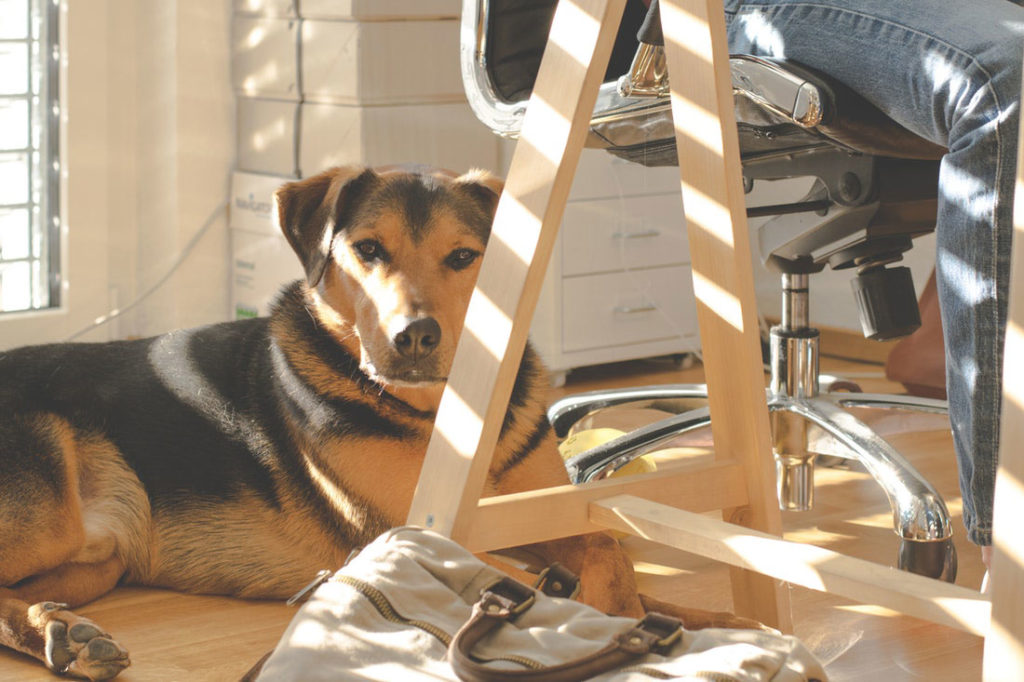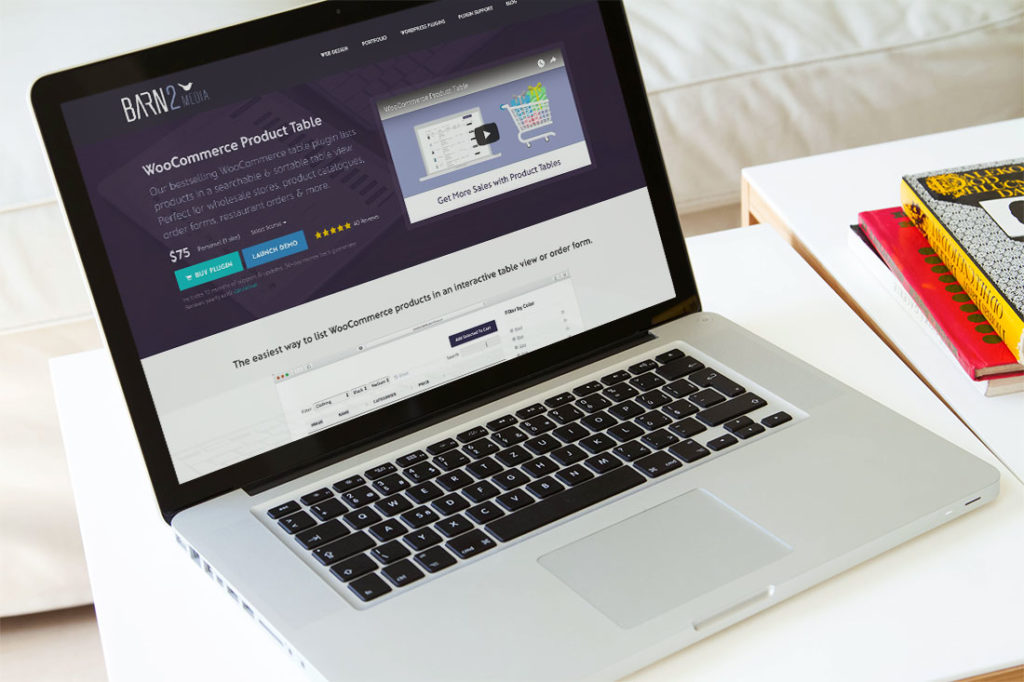The best thing about WordPress is that it’s accessible to all. Anyone can start a WordPress business, backed by an amazingly supportive global community. The barriers to entry are low and with only 25 percent of WordPress professionals working full-time, it attracts people wanting a successful business and a flexible lifestyle.
But how can you take your WordPress business to the next level? What if you don’t aspire to the traditional route of growing your company and taking on staff, an office, and everything that comes with that?
This is the story of how I co-founded Barn2 Media with my husband Andy, and scaled it from a startup to one of the UK’s best known WordPress agencies with over $300,000 annual revenue. We’ve scaled from a two-person company to a virtual team, and from a web design studio to a plugin business – all without employing a single person.
The Early Days
For years, my husband Andy and I worked traditional jobs while dreaming about starting our own business and building a more flexible lifestyle. We finally took the plunge in late 2009 – Andy quit his day job to start a web design business, which I supported alongside my existing job.
Andy had a software development background and mine was in project management and marketing. Web design felt like an industry that would suit us both while allowing us to work from home and have a flexible lifestyle. We soon discovered WordPress and have never looked back.
Since then, we have built a thriving WordPress company while always putting our lifestyle first. We’ve scaled the business alongside major life events such as having a baby, illness, and moving house. We don’t work crazy hours, and we regularly take time out of the working day for important activities such as hiking and eating out!
This is how I’ve learned to scale a WordPress business without employees, and how you can too.
How to Scale a Client-Facing WordPress Business
Like most WordPress businesses, Barn2 Media started by designing websites for clients. Back then, there was a shortage of WordPress specialists and we always had more work than we needed. Before long, all our work hours were spent building websites for other people – there was no time left over to develop our own business.
We made a lot of incremental improvements, such as switching from estimates to fixed pricing and prioritizing clients with higher budgets. These increased our income slightly and allowed me to quit my day job, but we weren’t sure how to scale the business beyond this. Lots of WordPress freelancers fall into the same trap.
Provide Repeatable Services
I used to say “Yes” whenever a client requested something new – even if I hadn’t done it before. I wasted lots of time learning new skills for each project, which weren’t repeatable for future projects. Once, I even designed a scaffolding advert for a builder whose website we had designed – nothing to do with WordPress!
If you provide every service that customers ask for, it’s impossible to work efficiently or scale your business. Instead of saying “Yes” to everything, focus on what you’re good at (and what you enjoy doing). By specializing in a particular service, you can increase your prices while working more efficiently. This helps to scale your business while decreasing your workload.
Bonus tip – Build passive income by making referral deals with other WordPress professionals. When a client requests a service you don’t provide, recommend someone who can help. The client will be grateful, and you’ll get paid commission if the work goes ahead!
Prioritize Ongoing Services
In the early days of Barn2 Media, I never looked beyond the go-live date for each project. Providing ongoing services such as hosting and maintenance felt like a distraction. I just wanted to take on as many new projects as possible. How wrong I was!
Ongoing services are an excellent way to scale your client-facing business, as the profit margins are much higher:
- Ongoing hosting – If you use a good quality managed WordPress host like we do with WP Engine, then it’s no hassle to host your clients’ websites. We now host over 70 websites, some dating as far back as 2010. A reliable company can take care of everything.
- Maintenance and software updates – All websites need maintenance, and you should convince clients to invest in keeping their website running smoothly. Website maintenance is one of the easiest tasks to outsource, as it’s standalone and easy to hand over. There are plenty of WordPress maintenance companies who can take care of your clients’ websites.
- Ongoing retainers – This one is harder to scale. There are only so many clients that you can support without employees, and the work can be quite fragmented and distracting. Used correctly, retainers are a good way to grow your income, as you’re already familiar with each website and can work efficiently.
Whenever a project goes live, aim to secure at least $100/month of ongoing revenue. This will quickly start adding up once you’ve got a few happy customers under your belt. Over time, ongoing services will provide semi-passive income that will scale your business.
Build a Distributed Team
By mid-2012, we had reached the limit of the number of websites we could develop ourselves. We’d worked hard to streamline our processes, and our income was similar to what we earned from our previous jobs. The business was pretty successful, but it had hit a ceiling. How could we continue to scale without taking on staff?
Answer: Build a distributed team of WordPress freelancers.
Working with freelancers is great because it doesn’t have the same overheads that you get with employees. You can hire people for individual projects, with no ongoing commitment. They’re responsible for their own training and development.
At its height, the Barn2 Media virtual team consisted of about 10 WordPress professionals working regularly together. We used various strategies to find the right people and thoroughly vetted new recruits just as if they were employees. We recruited people with different skills including designers, developers, and SEO experts.
Why We Stopped Doing Client Projects
Running a distributed team allowed us to scale the business from 10 to 20 projects at a time. However, we eventually reached another ceiling because I didn’t have time to manage any more projects.
I tried recruiting freelance project managers but wasn’t really prepared to provide the training to make it a success. It felt too much like training an employee!
Overall, we were burned out from designing websites for other people. We had scaled as far as we could and wanted to continue growing the business. We needed to think smarter and find a new direction. One that would allow us to scale even further without employees.
Sell Products, Not Services
I’ve met countless people who dream of generating passive income by selling WordPress-related products. We were the same.
Selling products sounds like an obvious way to scale a WordPress business, so it was the obvious next step for Barn2 Media. The theory is that you create a product once (e.g. a WordPress plugin or theme), and can sell it an unlimited number of times for the same amount of work. It doesn’t quite work like that because you have to provide support, but we have used products to scale the business to a new level.
How We Failed At Selling Themes
Our first attempt to build a WordPress product was a multipurpose theme called Ratio. Don’t bother Googling it – it was never launched. We spent a year building the theme as a sideline to the client business. The plan was to sell it on ThemeForest and tap into their huge customer base. Unfortunately, by the time we submitted the theme to ThemeForest, the design was no longer current and the market was dominated by huge themes such as Avada which we couldn’t compete with.
I do believe that you can scale a WordPress business by selling themes, but you need to focus on a specific niche where you can get enough exposure. You also need to move quickly and take an advantage of an opportunity before it’s too late. Unfortunately, we didn’t do either of these things.
Our Transition to a Plugin Business
In early 2016, we decided to enter the plugin world. We felt that niche plugins had more potential than themes because a plugin can offer specific functionality, which makes the support and development more manageable for a small company. Plugins are known to be easier to scale than many types of product.
We were well-known as a WordPress agency, but not as a plugin company. To start building a name for ourselves, we initially launched 2 free plugins – Better Recent Comments and Posts Table with Search + Sort.
While we hadn’t intended to monetize these plugins, Posts Table with Search + Sort quickly started opening up opportunities for scaling the business. It lists WordPress posts in a searchable and sortable table, and people immediately started asking to list other types of content too. We made this possible by creating 2 premium plugins – Posts Table Pro, which lists any type of WordPress content, and a dedicated e-commerce plugin called WooCommerce Product Table.
During 2016, we launched five premium WordPress plugins – all designed to solve a specific need. Our WooCommerce table plugin has been amazingly successful, and the others bring in a regular stream of sales. Within 6 months, the plugins were making enough money for us to stop taking on new clients, and we haven’t looked back since.
How to Scale a WordPress Product Business
In the 18 months since we started selling WordPress plugins, we’ve made lots of mistakes. We’ve created some successful plugins and other products, and some not-so-successful ones. We’ve learned how to structure the business in a way that maximizes sales without increasing our workload. Here’s how you can do the same:
Choose Your Products Wisely
Listen to the WordPress community and find out where the gaps are. Read about where to find ideas for WordPress plugins and create something that doesn’t already exist.
WordPress and WooCommerce have such huge market share that even very niche plugins can get plenty of sales. That’s good news because it’s easier to scale a business that sells small, very focused products. Don’t try to create the next WooCommerce – think small, and keep it realistic.
Provide Great Support (But Only When You Have To)
Good support can make or break a WordPress product business. Andy and I provide fast, helpful and personal support – without any support staff.
In 2017 we’ve quadrupled our plugin sales to over 200 per month – but still only spend a couple of hours a day on support. You can do the same by designing your products and documentation to prevent people from needing support:
- Build a knowledge base – Try to view every support request as an opportunity to make sure no one else asks the same question. Create a knowledge base and structure it so that customers are forced to search the documentation before they can request support. A good knowledge base will help customers to self-serve, reducing the support burden.
- Onboarding emails – Send an automated email to new customers, with clear instructions on how to set up the product, and links to the knowledge base.
- Design for user-experience – Your WordPress products should be clear and intuitive to use. Follow standard WordPress conventions in terms of navigation and usability. If lots of customers are making the same mistakes, redesign your product to stop these mistakes before they happen.
Don’t Reinvent The Wheel
Keep your WordPress company small by using off-the-shelf solutions. For example, we sell our plugins using Easy Digital Downloads and Heroic Knowledge Base. These save us time, so we don’t need employees to manage our website and documentation.
Add New Features Based on Demand
Keep a feature request list of all the improvements your customers are asking for. Create a scoring system and mark each feature request based on demand, impact, and difficulty. Only add new features when you know they’re achievable and will help to scale your business. This helps you to prioritize and create successful products without employing extra developers.
Streamline Your Processes
I believe that a small WordPress company can achieve just as much as a big one. WPML have an 11-step process for making amendments to their documentation. I just log into our website and edit the relevant article!
Diversify – But Not Too Much
Your business will be safer if you have more than one product. This will protect you from rivals and wider changes in the plugin industry. But at the same time, don’t spread yourself too thin.
We have five plugins, plus an online course, and an eBook. They all generate some income, but some are much more successful than others. We spend most of our time improving and promoting WooCommerce Product Table, while making sure the others provide that all-important safety net.
Plan Your Business to Scale
It’s true – scaling a WordPress business isn’t easy, especially if you want to keep your company small. However, I have done it, and you can too.
Over the past seven years, we’ve scaled our business from a 2-person startup to a virtual team; and from a virtual team to a thriving plugin company – all without employees. We’ve had successes and failures along the way, and learned from lots of mistakes.
Don’t just work hard – work smart. Think strategically about the nature of your business and how to scale it. Stop doing work that eats up your time and can’t be scaled. That way, you can scale your income while keeping the business small – and living the lifestyle you’ve always dreamed of.




5 Comments